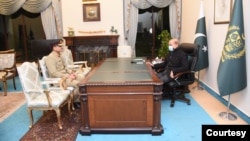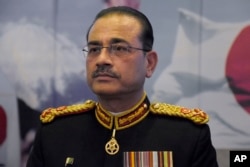Pakistani Prime Minister Shehbaz Sharif Thursday nominated the former head of the Inter-Services Intelligence, or ISI, the country’s main intelligence agency, as head of the powerful military amid deepening political turmoil in the country.
Officials said Sharif chaired a meeting of his Cabinet to pick General Asim Munir from a list of six senior generals to replace General Qamar Jawed Bajwa, set to retire next week, as the new chief of army staff.
Defense Minister Khawaja Asif announced the decision in a post-meeting statement, saying it has already been sent to President Arif Alvi for his mandatory approval. Asif later confirmed to state-run radio that the president had approved the appointment.
Munir will take command of Pakistan's nuclear-armed military from Bajwa next Tuesday at a ceremony at the general headquarters in the garrison city of Rawalpindi, adjacent to the capital, Islamabad.
As well as heading the ISI, Munir has commanded Pakistani troops in areas bordering Afghanistan and archrival India.
The nomination of the new military chief comes amid an intensified debate over the deepening interference of the institution in political affairs.
Bajwa’s leadership, in particular, has exposed the powerful military to severe public criticism lately, led by former Prime Minister Imran Khan.
The 70-year-old politician alleges Sharif and Bajwa colluded with the United States to orchestrate the toppling of his government in April through a parliamentary no-confidence vote. The cricket-star-turned populist deposed leader has not offered any evidence to substantiate his claims.
Khan, however, has toned down his anti-Bajwa rhetoric lately, saying that even if the general had not been involved in his removal, Bajwa could still have saved his government.
On Wednesday, Bajwa formally rejected Khan’s allegations in his last nationally televised address to families of fallen soldiers at the Pakistan military headquarters.
“A fake and false narrative was concocted to create a state of hysteria in the country,” stated the 62-year-old general.
Bajwa acknowledged his institution had been meddling in national politics for decades, occasionally exposing it to public criticism.
“I believe the major reason has been the military’s interference in politics for the past 70 years, which is unconstitutional,” the outgoing general said. “Therefore, in February last year the military decided after a lot of deliberation that it would never again interfere in any political matter in future.”
Bajwa did not, however, explain what prompted the military to disengage from politics, and critics swiftly questioned his claims.
Pakistan has experienced four military coups against elected governments since gaining independence in 1947, leading to more than three decades of dictatorial rule.
Bajwa became army chief in 2016 for a mandated three-year term and was given an extension for three years in 2019 by then-Prime Minister Khan.
Khan’s party welcomed the appointment of Munir as the new military chief.
“We hope that the new leadership of the armed forces of Pakistan will play its constitutional role so constitutional rights and democracy in the country are strengthened; and people’s rights to elect a new leadership through fresh elections would be recognized,” the PTI said in a statement.
Critics like Mohsin Dawar, chairman of the foreign affairs committee of the National Assembly - the lower house of parliament – voiced skepticism on whether the army chief-designate will be able to deliver on Bajwa’s pledge to take the military out of politics.
“General Bajwa's tenure as Army Chief was one of the worst eras of military's interventions. We don't expect much from his replacement as the institution's corporate interests compel individuals to go beyond their mandate. Course correction required for the country to survive,” tweeted Dawar, who is also a member of Sharif’s coalition government.
Critics say army interventions and inference have hampered the democratic process from taking root in Pakistan and they remain skeptical about the chances of the military becoming an apolitical institution.
“I would take Bajwa’s plea for the Army to get out of politics with many grains of salt,” said Michael Kugelman, the director of the South Asia Institute at the Wilson Center in Washington, when asked for comment on claims by the incumbent military chief.
“The institution has been so entrenched in Pakistan’s political fabric for so long, that it would be well-nigh impossible to engineer such a sharp shift,” Kugelman said in written comments to VOA.
Pakistani politicians have long accused the military of orchestrating the removal of elected governments that do not fall into line with the powerful institution, particularly when it comes to making foreign and security policies or questioning the military’s commercial interests.
Khan remains the most popular leader in Pakistan and his popularity has soared since his removal, with his Pakistan Tehreek-e-Insaf party sweeping national and provincial by-elections in recent weeks.
Since his removal from office, he has been leading massive protest rallies across the country, with tens of thousands of party supporters attending them.
Khan is pressing Sharif to dissolve his coalition government and announce early general elections in the country. The government has rejected the demand, saying elections will be held only after it completes its constitutionally mandated term by next August.
The deposed prime minister has also accused a senior ISI general along with Sharif and Interior Minister Rana Sanaullah of plotting a shooting on his rally earlier this month that left him wounded in the leg and killed one of his supporters. The government and ISI reject the allegations.
On Saturday, Khan plans to lead tens of thousands of supporters in Rawalpindi to push for his demand.






